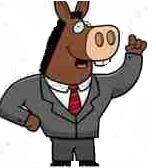Donkeys have worked for as long as I can remember, reading stories as a kid. The stories go on to say how donkeys don’t work smart but they work hard under supervision.
In the present conditions you might be dejected you are not getting a job. At times you come up with excuses like
Somebody has to give me a job to gain experience – how can I have experience without working?
According to that argument, a donkey has a higher chance of getting a job than you. I’ve also heard graduates say:
The job applications take so long, it’s hard work!
Again, a donkey would gladly do hardwork and keep going, as long as it takes. So why do I think that you still have a higher chance of getting employed than a hard working donkey? I’ll lay out the reasons point-wise:
- A donkey can only be that useful in making profit – your main leverage are your skills. Employers are looking for people who can be engaged (i.e. work in teams) in the work. You are expected to ‘work smart’ that is, find better ways to do the job, use your creativity. Innovate. Think. Implement. Make Profit. Be Hired. If you can’t do this, then the donkey can take orders, too and do the job. These are also the keywords for a promising performance at an interview!
- Donkeys don’t speak the language employers understand – I assume you will only apply to companies that will communicate in a language you know. Use the language skills to communicate. Employers are looking for graduates who can communicate well. Avoid making spelling or grammatical mistakes, run your written answers through MO Word application to check automatically. At interviews / panel discussion / assessment days / group discussions, speak what you think. If you are quiet or cannot communicate properly, then employing a donkey would be cheaper option for the company.
- Donkeys are loud and embarrassing when they are social – if I could post the sound of their laughter and social gathering, I would be prosecuted for disorderly conduct. But this is a key point in today’s age of technology. Employers conduct research on interviewees or graduates they are assessing, so if you have anything unsociable written or attributed to on the web, you will either be asked to explain, or rejected altogether. It is a similar fate, if you have embarrassing pictures as your profile picture, or have made albums available to the whole world. Keep your social image clean, do a search on yourself at every stage of employment.
These are three of the main points, that I think, make you a more employable character than a donkey. The point is, you might have all the qualities, but if you don’t work smart, be communicative, and have a clean social image, then it is very difficult to survive in today’s graduate market.
Work Smart – use the right keywords and explanations on your CV, cover letter and job applications. Don’t rush filling them in, read them and re-read them, get them reviewed by your careers service, or at least by friends who can critique it. It is not your experience, or number of part-time jobs that count – the employer wants to know that you can work in different environments and be supervised. You can use examples from volunteering, and you should definitely do some volunteering if you don’t have work experience on your CV.
Communicate – if you are quiet or shy, practice speaking. If you have low self confidence – read books. Read papers. Knowledge improves confidence – that is from personal experience. You can be the best candidate and that is visible from your CV, but if you don’t express yourself well and communicate freely with the interviewer, he/she cannot make a sound judgement on the basis of facts that you have NOT provided. Don’t be scared of interviews, if you are, you won’t get the job. And if you aren’t getting the job, you might as well enjoy it. Again, confidence in yourself is the key.
Background search – it used to be a technical term and it still is, but now it also constitutes your facebook/twitter/linked-in/google plus accounts, and basically everything that can be searched freely on the internet.
I hope I’ve made clear now why I think you have a higher chance of being employed than a donkey. If you’ve liked this, please ‘facebook like’ it or tweet it. It’s not meant to be offensive, but the reality is, Career Geek Blog is about bringing you honest and tested advice to help you succeed in the graduate market.


